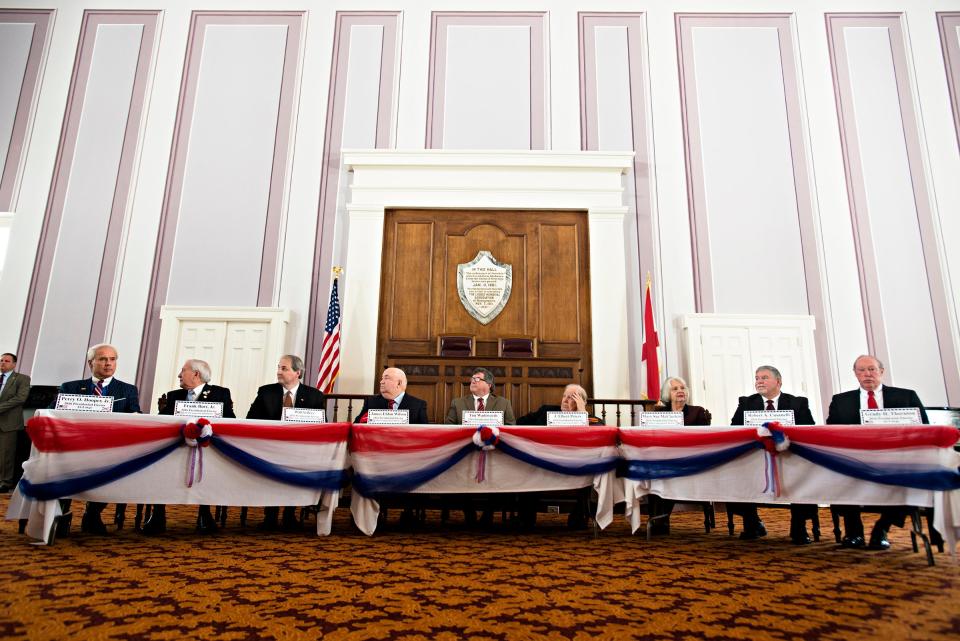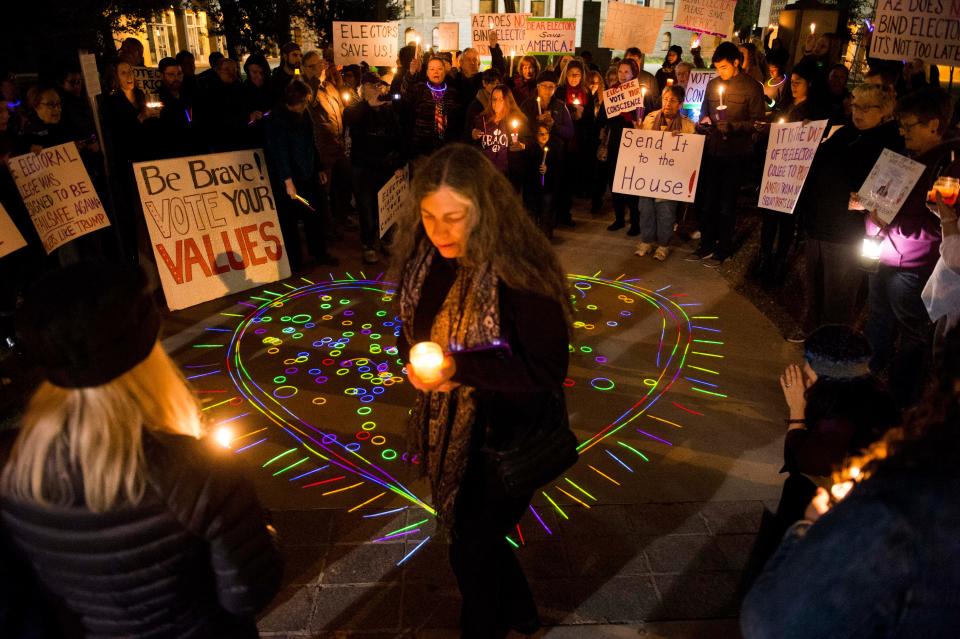With Biden winning the popular vote, here's how America could end the Electoral College
DENVER – As the presidential election between President Donald Trump and former Vice President Joe Biden focuses increasingly on a few swing states that will determine the winner, millions of Americans are asking why their votes are essentially being taken for granted.
Now, a long-running effort to make the nation's presidential election a "one person, one vote" system is gaining favor among partisan Democrats still angry that Trump won the 2016 presidency despite losing the popular vote by more than 2.8 million votes. Anxious voters continued waiting Thursday for results, which at the time showed Biden ahead of Trump with a significant amount of both popular and Electoral College votes.
Colorado is the latest state to adopt the National Popular Vote Interstate Compact, which seeks to essentially abolish the Electoral College without going through the near-impossible task of amending the U.S. Constitution. Coloradans on Nov. 3. approved the measure 52.1% to 47.8%, according to preliminary results.
The idea of abolishing the Electoral College has been around for decades, but the current proposal became more popular after Al Gore lost the 2000 election. It hinges on states agreeing to dedicate their electoral votes to whoever wins the overall popular vote for president, rather than dedicating their votes to the candidate who won their individual state.
Unlike most elections in the U.S., the presidency is decided not directly by voters but by members of the Electoral College, who are assigned based on the results of the popular vote in each state.
Colorado now joins 14 states and Washington, D.C., as members of the compact, which takes effect once states with a total 270 electoral votes sign on. Colorado's nine electoral votes take the total to 196.
Supporters say the measure would force candidates to campaign in states that today are often taken for granted because they vote so reliably Democrat or Republican that they can be safely ignored.
The proposal received new attention after the U.S. Supreme Court in July ruled that Electoral College electors in 32 states are legally obligated to cast their vote for the winner of their state's vote, rather than selecting someone else.
Clinton's 2016 loss emboldened Electoral College critics
While the plan's longtime backers have pushed it in large part on a philosophical basis, some frustrated Democrats have hopped aboard in hopes of avoiding a repeat of the 2000 and 2016 elections, where Republicans George W. Bush and Trump lost the popular vote but still claimed the presidency.

Many of the former 2020 Democratic presidential candidates generally supported either abolishing the Electoral College entirely or just using the compact to make it obsolete. Biden, however, has said he opposes changing the current system.
"The 2016 election was a good reminder of our democracy and what we need to do protect every single piece of it," said Daniel Ramos, former executive director of the LGBTQ advocacy group One Colorado. "The conversation (supporting the initiative) seemed even more prominent given that Hillary Clinton won the popular vote and Donald Trump still became the president."
Electoral College votes are generally distributed based on population, but highly populated states like California and New York, which tend to favor Democrats, have proportionally fewer votes. That's because the Electoral College system was also designed to give rural states a larger vote than they might otherwise be entitled to, especially those at the time with large populations of enslaved African Americans.
Today, California, for instance, has 40 million residents and 55 electoral votes, while Wyoming has about 560,000 residents and three votes. That means Wyoming's electors represent about 186,300 voters apiece, while California's are proxy for more than 727,000 each. In other words, Wyoming's Electoral College votes count almost four times more than California's on a per-person basis.
Each state has as many Electoral College votes as it does members of Congress. The 2020 Census will likely cause some states to lose votes while others gain as the nation's population shifts.

Race to White House hangs on swing states
Because most states have a "winner take all" policy for awarding those electoral votes, a candidate who just barely loses a large state's popular vote gets zero electoral college votes. That means candidates are increasingly focusing on swing states they might win while largely ignoring states that will either reliably support them or their opponent.
In the 2020 presidential election, much of the focus has been on close races in Arizona, Florida, Michigan, North Carolina, Pennsylvania and Wisconsin. In the waning days, both Trump and Biden campaigned frequently in Pennsylvania in particular, which is still counting votes as of Thursday afternoon. Neither has campaigned heavily in either California, which is firmly Democratic, or Wyoming, which largely votes Republicans.
The League of Women Voters, the nonpartisan elections advocacy group, has long called for the Electoral College to be abolished or changed, and it has backed the popular-vote compact for 50 years. The league argues every vote should be weighted the same, regardless of who it benefits politically, because the concept of "one person, one vote" is so central to the American ideal.
Among the states that have adopted the compact: Vermont, California, New York and Illinois.
"We think elections should be done with 'one vote for one person' for every election, right down to student council," said Ruth Stemler, president of the Colorado League of Women Voters. "We're sorry that it's taken us 50 years, but it's time for our democracy to take care of this now."
Supporters of a popular vote point out that while independent presidential candidate Ross Perot won 19% of the overall vote in 1992, he didn't collect a single electoral vote because he didn't "win" a single state. And while generally the winner of the popular vote becomes president, the Electoral College picked someone else five times, in 1824, 1876, 1888, 2000 and 2016.
Some Democrats and Republicans want the popular vote to pick the president
A poll in Colorado a year ago by Magellan Strategies found that support for joining the compact split largely along party lines, strongest among younger Democrats and opposed most strongly by older Republicans.
Former California Republican legislator Ray Haynes Jr. said he has always counted himself a fan of the Electoral College but now also supports the popular-vote compact because it would force candidates to campaign in more places.
Haynes, who served in both the California Assembly and Senate starting in 1992 and was chairman of the conservative American Legislative Exchange Council, argues the winner-takes-all approach used by 48 states and the District of Columbia improperly makes candidates focus on "a battleground precinct in a battleground city in a battleground county in a battleground state," giving residents in those areas a disproportionate amount of influence.
"The party spends so much time to persuade these moderate Republicans in their battleground states that they lose the conservative message," said Haynes, who has campaigned for the popular-vote compact. "A lot of the national policy gets driven by very narrow slices of voters in very narrow slices of certain states. You ought to listen to everybody."
Hayes said the Republican Party can overcome the natural inclination of urban residents to vote Democrat by offering a consistent conservative message: "You get in the trenches, I get in the trenches and we battle it out over ideas."
In the 2016 general election campaign, half of all campaign events were held in just Florida, North Carolina, Pennsylvania and Ohio, highlighting their importance in the Electoral College calculations, according to compact backers.

But critics say the measure would actually give more power to Democrat-dominated coastal cities in New York and California, where in 2016 Clinton ran up huge overall margins but still lost the Electoral College and therefore the presidency to Trump. Under the popular vote, a Democrat could campaign more efficiently by focusing on large cities that already tend to lean liberal, counting on their support to overwhelm less-populated but more conservative areas.
In Colorado, conservative commentator Krista Kafer, who opposes the popular vote, said she's convinced the current system forces more coalition-building. Many conservatives joke that direct democracies are the equivalent of two wolves and a sheep voting on what to eat for dinner.
"Politicians would spend the season courting Californians, New Yorkers, Illinoisans and Floridians," Kafer said. "Those of us in flyover country and our concerns would be ignored."
Supporters of the current system say the Electoral College has served the nation well for generations by ensuring rural areas are heard.
"The Constitution, in a lot of ways, is designed to make sure we don't have big cities just running everything," said Trent England, director of Oklahoma-based Save Our States, which opposes the popular-vote compact.
This article originally appeared on USA TODAY: End the Electoral College? Why some states want the popular vote

